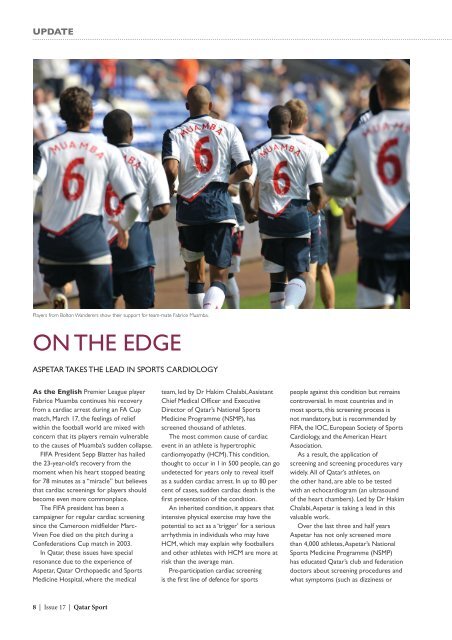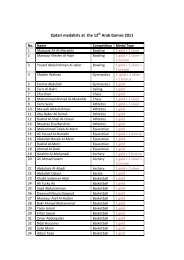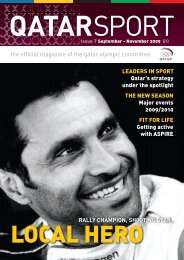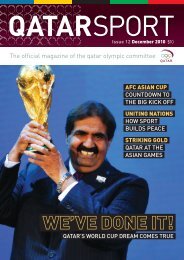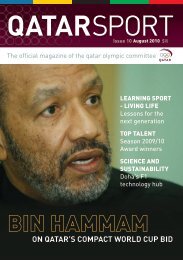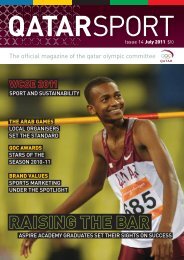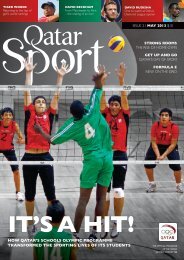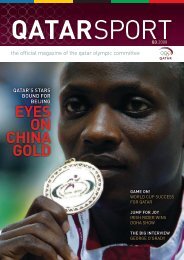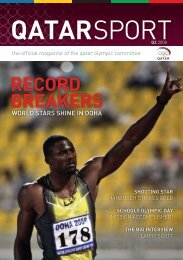Qatar sport COVERMG.indd - Qatar Olympic Committee
Qatar sport COVERMG.indd - Qatar Olympic Committee
Qatar sport COVERMG.indd - Qatar Olympic Committee
You also want an ePaper? Increase the reach of your titles
YUMPU automatically turns print PDFs into web optimized ePapers that Google loves.
UPDATE<br />
Players from Bolton Wanderers show their support for team-mate Fabrice Muamba.<br />
ON THE EDGE<br />
ASPETAR TAKES THE LEAD IN SPORTS CARDIOLOGY<br />
As the English Premier League player<br />
Fabrice Muamba continues his recovery<br />
from a cardiac arrest during an FA Cup<br />
match, March 17, the feelings of relief<br />
within the football world are mixed with<br />
concern that its players remain vulnerable<br />
to the causes of Muamba’s sudden collapse.<br />
FIFA President Sepp Blatter has hailed<br />
the 23-year-old’s recovery from the<br />
moment when his heart stopped beating<br />
for 78 minutes as a “miracle” but believes<br />
that cardiac screenings for players should<br />
become even more commonplace.<br />
The FIFA president has been a<br />
campaigner for regular cardiac screening<br />
since the Cameroon midfielder Marc-<br />
Viven Foe died on the pitch during a<br />
Confederations Cup match in 2003.<br />
In <strong>Qatar</strong>, these issues have special<br />
resonance due to the experience of<br />
Aspetar, <strong>Qatar</strong> Orthopaedic and Sports<br />
Medicine Hospital, where the medical<br />
team, led by Dr Hakim Chalabi, Assistant<br />
Chief Medical Officer and Executive<br />
Director of <strong>Qatar</strong>’s National Sports<br />
Medicine Programme (NSMP), has<br />
screened thousand of athletes.<br />
The most common cause of cardiac<br />
event in an athlete is hypertrophic<br />
cardiomyopathy (HCM). This condition,<br />
thought to occur in 1 in 500 people, can go<br />
undetected for years only to reveal itself<br />
as a sudden cardiac arrest. In up to 80 per<br />
cent of cases, sudden cardiac death is the<br />
first presentation of the condition.<br />
An inherited condition, it appears that<br />
intensive physical exercise may have the<br />
potential to act as a ‘trigger’ for a serious<br />
arrhythmia in individuals who may have<br />
HCM, which may explain why footballers<br />
and other athletes with HCM are more at<br />
risk than the average man.<br />
Pre-participation cardiac screening<br />
is the first line of defence for <strong>sport</strong>s<br />
people against this condition but remains<br />
controversial. In most countries and in<br />
most <strong>sport</strong>s, this screening process is<br />
not mandatory, but is recommended by<br />
FIFA, the IOC, European Society of Sports<br />
Cardiology, and the American Heart<br />
Association.<br />
As a result, the application of<br />
screening and screening procedures vary<br />
widely. All of <strong>Qatar</strong>’s athletes, on<br />
the other hand, are able to be tested<br />
with an echocardiogram (an ultrasound<br />
of the heart chambers). Led by Dr Hakim<br />
Chalabi, Aspetar is taking a lead in this<br />
valuable work.<br />
Over the last three and half years<br />
Aspetar has not only screened more<br />
than 4,000 athletes, Aspetar’s National<br />
Sports Medicine Programme (NSMP)<br />
has educated <strong>Qatar</strong>’s club and federation<br />
doctors about screening procedures and<br />
what symptoms (such as dizziness or<br />
8 | Issue 17 | <strong>Qatar</strong> Sport


